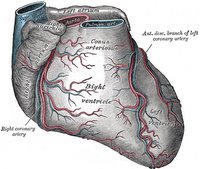 There has been a lot of discussion in the medical blogs recently about the usefulness (or lack) of physical examination.
There has been a lot of discussion in the medical blogs recently about the usefulness (or lack) of physical examination.I personally think that physical exam is very important but when "the HMOs force physicians to care for a maximum number of patients, in a minimum number of minutes for the lowest number of dollars" something has to give...
One of the comments on KevinMD says that clearly: "Why do I have the feeling this guy never had to see 40 patients a day at 15-minutes per encounter... I bet his physical exams would leave a lot to be desired at that rate."
Anyway, if you want to refresh your skills, you can review this large collection of free physical examination videos organized by body system.
Update 3/23/2007:
Dr. Wes comments on "Procedural Darwinism":
Take the stethoscope, for instance. It is rapidly succumbing to Procedural Darwinism. If it weren’t for the stethoscopes ability to hear breath sounds, it would have been extinct long ago. The echocardiogram is far superior to “hear” heart sounds, and adds procedural survival protection by providing additional size, structure, and functional information regarding the heart with little pain or toxicity to the patient. The echo also reimburses well.
Further reading:
Hyposkillia. Deficiency of Clinical Skills. Herbert L. Fred, MD, MACP. Tex Heart Inst J. 2005; 32(3): 255–257.
Comments about deficiency of clinical skills. Retired doc's thoughts.
Declining clinical skills. Notes from Dr. RW.
An old-timer bemoans the demise of the physical exam, or hyposkillia. KevinMD.
The Danger of Being "Too Fast"
In defense of clinical skills. Notes from Dr. RW.
What does the evidence say about clinical skills? Notes from Dr. RW.
Time, Now, to Recover the Fun in the Physical Examination Rather Than Abandon It. Arch Intern Med. 2006;166:603-604.
Imagine: Physical Exam Can Save Lives. Dr. Wes, 08/2007.
The Physical Exam Can Be Pretty Important, Part 2. Dr. Val and The Voice of Reason, 03/2008.
Mourning the loss of basic clinical skills. Notes from Dr. RW, 2009.
Updated: 09/09/2009


























